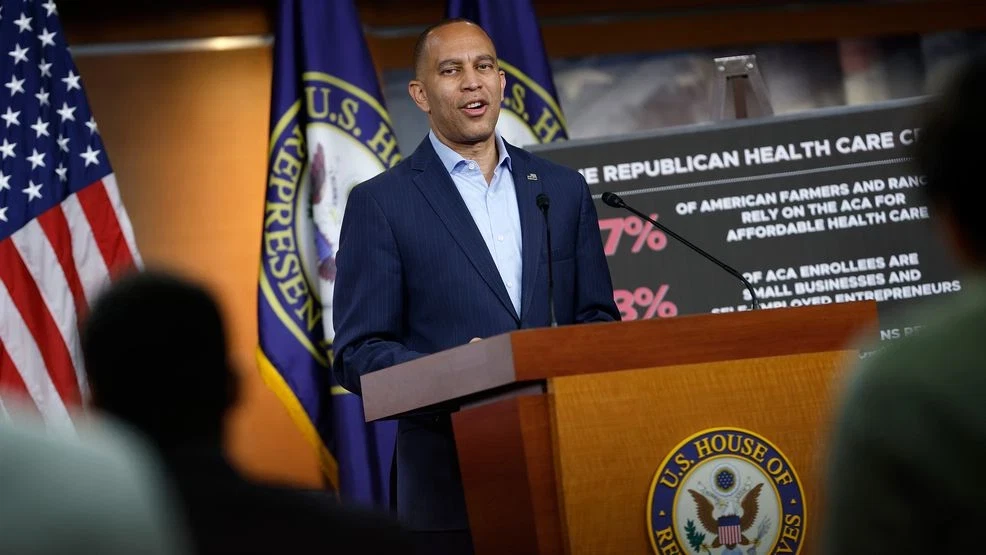
The door appears cracked at least for negotiations to occur over the health care subsidies that are at the heart of Democrats’ demands to reopen the government.
Republicans in the House have passed a so-called clean continuing resolution, which is a bill to reopen the government and keep spending at current levels until late November.
But they don’t have enough Democrats in the Senate to pass the stopgap measure.
Democrats are seeking the reversal of Medicaid changes that were part of the GOP “One Big Beautiful Bill” and an extension of the Affordable Care Act enhanced tax credits.
President Donald Trump Monday in the Oval Office that he’s open to a deal with Democrats to extend the ACA, or Obamacare, subsidies.
“We are speaking with the Democrats, and some very good things could happen with respect to health care,” Trump said.
But Trump also criticized Obamacare as a “wreck” that needs to be “propped up” and later that Democrats need to agree to the stopgap funding to reopen the government before health spending negotiations can take place.
Senate Democratic leader Chuck Schumer said during an interview to claim negotiations are taking place.
And House Democratic leader Hakeem Jeffries on Tuesday of the ACA subsidies.
A was introduced over a month ago that would provide a one-year extension.
Jeffries called the short-term extension of Obamacare subsidies “laughable,” saying it was introduced by the same Republicans who just permanently extended tax breaks “for their billionaire donors.”
“It makes no sense,” Jeffries said. “The Democratic position has been clear. Permanent extension, and let’s go from there in terms of a negotiation.”
, the Political Management program director at George Washington University, said there appears to be an off-ramp from the shutdown if Democrats are willing to give in on their demands.
The one-year extension of Obamacare subsidies would push the issue to after the midterm election. And that means Democrats might even have a stronger negotiating position at that time if they recapture the House, as might happen.
Belt said extending ACA subsidies will be easier to accomplish than rolling back the GOP-passed Medicaid changes, which don’t kick in until after the midterm.
“I absolutely think the Democrats will take a partial victory, because they don’t seem to have a Plan B here,” Belt said. “And they’ve sort of painted themselves into a corner.”
SEE MORE:
showed a strong majority of Americans support extending the ACA subsidies. Overall, 78% support the extension, including 59% of Republicans.
Belt said Democrats are going to find it harder to score a Medicaid victory.
Republicans passed Medicaid work requirements that are set to take effect in 2027 as part of this summer’s One Big Beautiful Bill.
Belt said the Medicaid cuts will affect a lot of people in Republican districts. But Republicans aren’t going to reverse something they just worked so hard to pass.
“I think that’s a real nonstarter for them,” Belt said. “I think that they would allow an up and down vote. I think the Democrats would allow that too, knowing that it’s going to lose.”
, an associate professor of public health at Ohio State University, also said Democrats have a more realistic shot at getting the Obamacare subsidies extended than getting the Medicaid changes reversed.
Democrats frame the Medicaid changes as cuts to the program, which is true in some sense, Haeder said.
Whether they’re cuts or not comes down to “semantics,” he said.
The GOP bill implemented Medicaid work requirements, which Haeder said will result in people losing coverage.
Some will lose coverage because they can’t or don’t want to fulfill the work requirements.
Others will lose coverage because they can’t manage the administrative hassle, Haeder said.
“The effect is people lose coverage,” he said. “Technically, you didn’t cut coverage.”
Republicans also made some changes to the way states are allowed to fund the Medicaid program, and that could also lead states to roll back some benefits.
“The changes, whether you support them or not, implemented in the (One Big Beautiful Bill) are going to result in some people losing coverage and then services probably diminishing,” Haeder explained. “The program itself, because of economic conditions and social conditions in this country, will continue to grow.”
The Medicaid changes, along with the expiration of the Obamacare subsidies, are expected to result in millions of Americans losing health care coverage.
ACA subsidies have been around for more than a decade. But enhanced subsidies kicked in during the pandemic, and those are about to expire.
Obamacare enrollment more than doubled after the enhanced subsidies came along, Haeder said.
If they go away, ACA premiums are set to rise by more than 75% in 2026, he said.
Increasing premiums might be the most direct impact on people.
But Haeder said rising costs would likely also dissuade healthy people from spending on health insurance.
And that’ll leave a greater share of sick enrollees, which will strain the system and likely put additional upward price pressures on insurers that don’t want to lose money.
If Republicans and Democrats decide to hammer out a deal on the Obamacare subsidies, they’d better act fast.
“Open enrollment’s starting in a couple weeks,” Haeder said. “Insurers need to plan. Insurers need to send out renewal letters and all that kind of stuff. So, I think that’s the compromise I see (being) plausible. I think the other stuff is a bit of an overreach.”
Belt said ending the shutdown is the only leverage Democrats have, so he doesn’t see them signing on to the Republicans’ temporary funding bill without at least getting an extension of the Obamacare subsidies.
Belt said that a deal could be reached in the next week or so, with the ACA subsidy extension baked into a new stopgap funding bill.